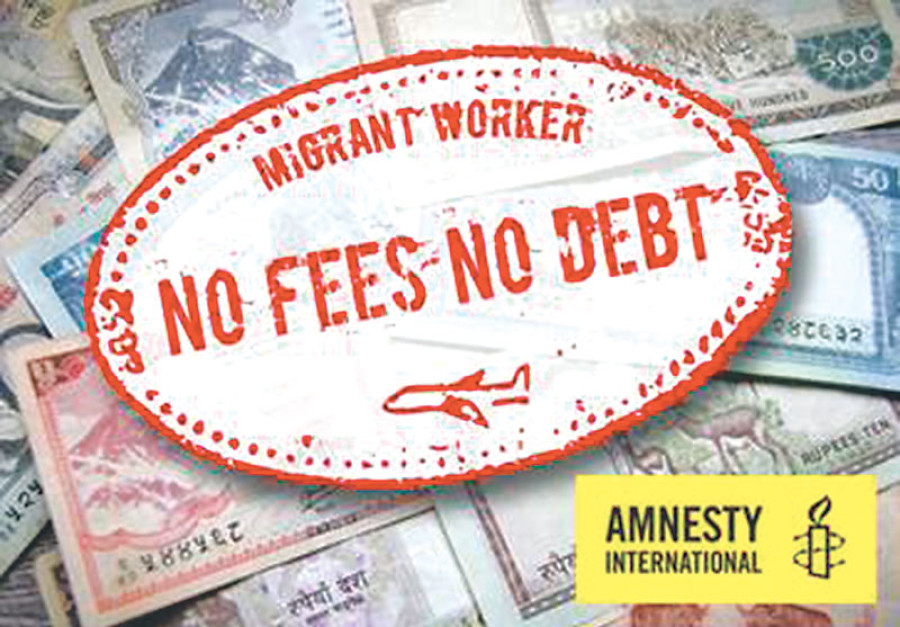Opinion
Seize the moment
For Nepalis, there is no ‘safe migration’ without the end of debt bondage
James Lynch
In March, Nepal became the new Chair of the Colombo Process—a group of Asian countries who share the aim of “optimising the benefits of organised labour migration whilst protecting their migrants from exploitative practices in recruitment and employment.”
If Nepal wants to meaningfully lead this process, then it has to lead by example. It should start by effectively tackling the blight of extortionate recruitment fees. Nepali migrants continue to see their dreams of good jobs abroad crushed by the fraudulent promises of recruiters, and the unsustainable debts they take on to pay recruiters for jobs. Too often, recruitment agencies are allowed to deceive and exploit migrants without fear of punishment, leaving aspiring young workers at high risk of forced labour and human trafficking.
No implementation
In 2015, Nepal took steps to confront high recruitment fees with the introduction of the “Free Visa, Free Ticket” policy, which aimed to shift the financial burden of flight tickets and visa costs from workers to foreign employers, requiring employers in seven destination countries to pay these costs. Given the government’s inadequate budget allocation for migrant protection, this pledge to reduce the recruitment fee burden for workers seemed positive.
Yet, in interviews for our new report released yesterday, Nepali migrants, civil society and recruitment agencies have all told Amnesty International that the government issued a policy that it did not then go on to implement.
For their part, migrants generally see the “Free Visa, Free Ticket” policy as yet another broken promise they must contend with when navigating exploitative recruitment processes. “The policy is just a good slogan for the government” said Bimal, a returnee migrant who failed to find a recruitment agency willing to give him a free visa and ticket. “It’s nice for our population to hear that they will only pay Rs10,000 and go on to earn Rs30,000 a month. But by now, everyone knows it is almost impossible to find an agency willing to give you a job for that price.”
Nepali civil society also express their doubts, pointing out that there has been no real plan for the policy’s implementation: no new mechanisms have been created and no new resources allocated to oversee compliance. “It is questionable if the government ever intended to change the system”, said one activist.
Meanwhile, recruitment agencies reject the policy outright, dismissing it as an “impractical” policy that they say threatens to “kill their business.” Instead of exploring how the policy could be properly implemented and putting forward constructive proposals, some agencies promote arguments that justify why migrants must pay for the right to work.
Workers as commodities
“Recruitment [fees] must be high”, one agency head told Amnesty International, “otherwise people will change their minds, run away to an ‘easier’ job, and the employer will ask us to compensate him for a lost worker.” Comments like this betray a perception of migrant workers as commodities, a view that promotes forced labour and provides fertile ground for further exploitation. When agencies feel like this, it should not be a great surprise that some migrant workers return to Nepal after years of back-breaking work more indebted than they ever were.
Amnesty International finds that migrants and civil society are right when they say that the government is weak when it comes to monitoring, investigating and punishing recruitment agencies for abuses. The Department of Foreign Employment told us that it had carried out just 120 monitoring visits to agencies in the last financial year. There are more than 750 agencies that sent abroad more than 400,000 migrant workers in the same year. The scale of government oversight has to be drastically overhauled to give the “Free Ticket Free Visa” policy a chance to work. If that doesn’t happen, rogue agents will continue to believe they have the green light to exploit desperate people.
The “Free Visa Free Ticket” policy was a step in the right direction and has the potential to position Nepal as a regional leader moving towards full zero-cost recruitment. It has not delivered until now, but it is not too late. Nepal’s politicians can punish recruiters who overcharge and deceive migrants and provide incentives to those who respect workers’ human rights. They can push for Nepal to negotiate for stronger bilateral agreements with countries that receive its migrant workers, incorporating the policy’s provisions on minimal fees for workers. Finally, they can deliver desperately needed legal and institutional reforms, such as revising Nepal’s Foreign Employment Act and giving police more authority to investigate recruitment abuses.
The scandal of abuse of migrant workers around the world continues to gain in prominence, whether it be building football infrastructure in Qatar, assembling electronic components in Malaysia or working in homes in Lebanon. Nepali migrants have too often been affected by such shocking cases. The government should seize this moment, when destination countries and multinational companies share an interest in preventing migrant labour abuse, to take decisive action.
- Lynch is Deputy Director of Amnesty International’s Global Issues programme




 9.7°C Kathmandu
9.7°C Kathmandu










